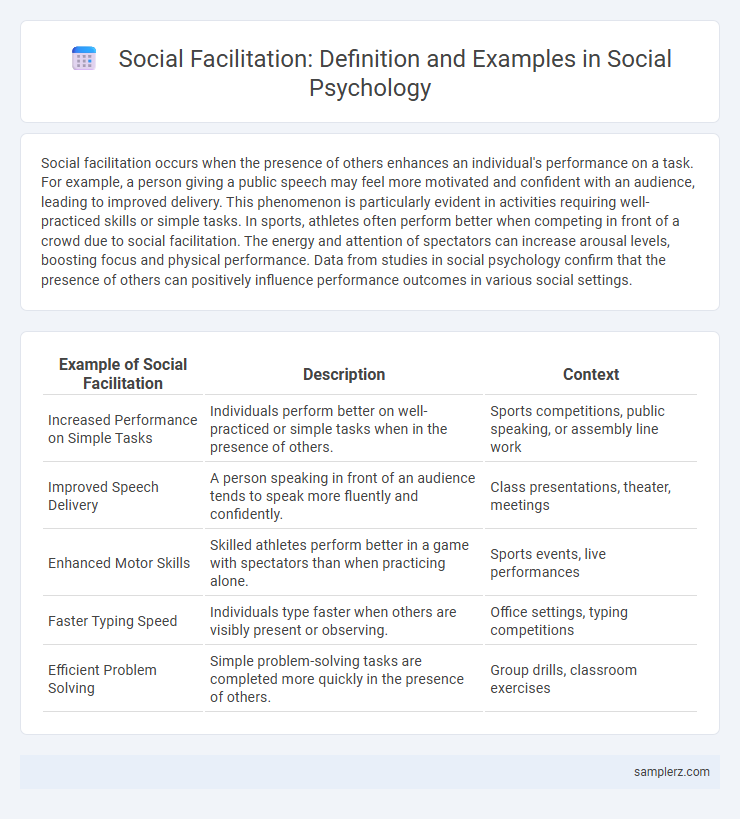Social facilitation occurs when the presence of others enhances an individual's performance on a task. For example, a person giving a public speech may feel more motivated and confident with an audience, leading to improved delivery. This phenomenon is particularly evident in activities requiring well-practiced skills or simple tasks. In sports, athletes often perform better when competing in front of a crowd due to social facilitation. The energy and attention of spectators can increase arousal levels, boosting focus and physical performance. Data from studies in social psychology confirm that the presence of others can positively influence performance outcomes in various social settings.
Table of Comparison
| Example of Social Facilitation | Description | Context |
|---|---|---|
| Increased Performance on Simple Tasks | Individuals perform better on well-practiced or simple tasks when in the presence of others. | Sports competitions, public speaking, or assembly line work |
| Improved Speech Delivery | A person speaking in front of an audience tends to speak more fluently and confidently. | Class presentations, theater, meetings |
| Enhanced Motor Skills | Skilled athletes perform better in a game with spectators than when practicing alone. | Sports events, live performances |
| Faster Typing Speed | Individuals type faster when others are visibly present or observing. | Office settings, typing competitions |
| Efficient Problem Solving | Simple problem-solving tasks are completed more quickly in the presence of others. | Group drills, classroom exercises |
Real-Life Examples of Social Facilitation
Social facilitation is evident when athletes perform better during competitions compared to practice sessions, as the presence of an audience increases arousal and motivation. Students often show improved recall during public presentations or oral examinations due to heightened social evaluation. Similarly, employees might complete routine tasks more efficiently in open office environments where colleagues observe their work.
Social Facilitation in the Workplace
Social facilitation in the workplace occurs when employees perform tasks more efficiently or with greater enthusiasm in the presence of colleagues or supervisors, such as a salesperson closing more deals during team meetings. This phenomenon enhances productivity by increasing motivation and arousal levels when individuals are observed. Studies show that simple or well-practiced tasks benefit from social facilitation, while complex tasks may experience performance impairment under social evaluation.
Social Facilitation During Group Sports
Social facilitation during group sports occurs when athletes perform better in the presence of teammates or spectators due to increased arousal and motivation. The phenomenon enhances individual performance in tasks such as sprinting, shooting, or passing, driven by the desire to meet social expectations and avoid negative evaluation. Research shows this effect is especially pronounced in well-practiced skills and competitive environments, highlighting the influence of social dynamics on athletic performance.
Impact of Social Facilitation in Education
Social facilitation enhances student performance by increasing motivation and focus when peers are present, leading to higher participation and engagement in classroom activities. Research shows that the presence of classmates can improve individual productivity on tasks such as solving math problems or reading aloud. This phenomenon boosts collaborative learning outcomes and helps students develop confidence through positive social interaction.
Social Facilitation in Public Speaking Events
Social facilitation in public speaking events occurs when the presence of an audience enhances a speaker's performance due to increased arousal and motivation. Research shows novice speakers might experience anxiety, while experienced presenters often deliver more fluent and confident speeches in front of larger crowds. This effect highlights the role of audience evaluation in boosting task execution during performances.
How Audiences Influence Performance
Social facilitation occurs when the presence of an audience enhances an individual's performance on simple or well-practiced tasks, as demonstrated in sports where athletes often perform better under the watchful eyes of spectators. Conversely, tasks that are complex or unfamiliar may lead to decreased performance due to heightened anxiety or self-consciousness caused by audience presence. Research in social psychology highlights how this phenomenon is linked to increased arousal levels, which amplify dominant responses in social settings.
Social Facilitation and Online Communities
Social facilitation occurs in online communities when the presence of others enhances individual performance, such as increased participation and faster response times in virtual discussion forums. Members tend to contribute more actively to online groups like Reddit or specialized Facebook communities due to real-time feedback and social presence cues. This phenomenon boosts collaborative efforts and knowledge sharing within digital platforms, reinforcing community engagement and support.
Social Facilitation in Competitive Settings
Social facilitation in competitive settings enhances individual performance through increased arousal and motivation caused by the presence of competitors and observers. Research shows athletes often improve their execution of simple or well-practiced tasks during competitions due to heightened focus and energy levels. Conversely, performance on complex or new tasks may decline under the same conditions, highlighting the importance of task familiarity in competitive environments.
Everyday Instances of Social Facilitation
In everyday social settings, social facilitation occurs when individuals perform tasks better in the presence of others, such as a student solving math problems faster during group study sessions. Performance of well-practiced skills improves while being observed, like an athlete running faster when cheered on by a crowd. Simple, familiar tasks benefit from social facilitation, enhancing motivation and focus in communal environments.
Social Facilitation Effects on Creativity and Collaboration
Social facilitation enhances creativity and collaboration by increasing individuals' motivation and performance when working in the presence of others. Studies show that group settings stimulate idea generation and problem-solving through heightened arousal and social cues. This effect boosts innovative thinking and teamwork efficiency in both professional and educational environments.

example of social facilitation in social Infographic
 samplerz.com
samplerz.com